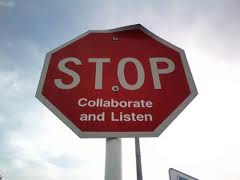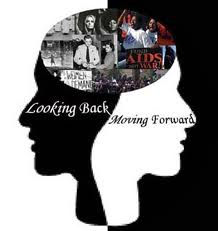Collaborative Governance - restoring effective representation
-
Socialism (collectivism) isn't the ONLY choice for effective program and service delivery. It's just the ONLY choice you've been offered.
The search for a 'new paradigm' in governance that 'adapts' the concepts of direct democracy and leads us to a point where 'individuals' rather than 'political parties' are expected to 'effectively collaborate' with each other to bring solutions to the governance of society - in an non-partisan requires that we must first learn to Take the 'politics' out of 'government'.
I can hear the nay-sayers immediately rush to 'pooh-pooh' the very notion that such collaboration is even within the realm of possibility. Certainly when we look at the competing political interests at play in our current system of governance - that would be a fair assumption to make. However I am going to make the case, from my experience and training in the field of creating and implementing 'cultural' change across organisations and within public/private partnerships - and demonstrate that such a level of non-political collaboration is not only possible - it is essential - to effective, progressive, de-centralized governance.
I am in my element here and trust you too can entertain and embrace the challenges of a 'cultural shift'.
The Premise:
- Substantial public value is being lost to insufficient collaboration because political pluralism tends to create institutional and political pressures that “push for differentiation rather than integration, where the basis for differentiation is typically political rather than technical. They focus on antecedents and enhancing collaborative performance — at the expense of wrestling with the process itself — means that we are missing an important piece of the puzzle.
Developing a more systematic approach to the process of collaboration by focusing on it's five defining dimensions increases the likelihood that public officials will be able to manage the intrinsic challenges of collaboration. A more systematic attention to understanding the process of collaboration will further the public value of this emerging paradigm in which individuals collaborate for mutual (collective) benefit.
Collaboration is the act or process of “shared creation” or discovery. It involves the creation of new value by doing something new or different. It is transforming in the sense that you don’t leave the same way you came in. There’s some sort of change. Something happens differently because of the process. Collaboration is when everybody brings something to the table (expertise, money, ability to grant permission). They put it on the table, take their hands off and then the 'team of individuals' creates from there.
- The roots of collaboration are buried deep in democratic life and public administration. When placed within the context of a public democratic ethos, collaboration can be understood as a process that is rooted in two competing political traditions: classic liberalism and civic republicanism.
-
Classic liberalism, with its emphasis on private interest, views collaboration as a process that aggregates private preferences into collective choices through self-interested bargaining.Organizations enter into collaborative agreements to achieve their own goals, negotiating among competing interests and brokering coalitions among competing value systems, expectations, and self-interested motivations.
- Civic republicanism, on the other hand, with its emphasis on a commitment to something larger than the individual (whether that be a neighborhood or the state), views collaboration as an integrative process that treats differences as the basis for deliberation in order to arrive at “mutual understanding, a collective will, trust and sympathy and the implementation of shared preferences”.
- Public officials often find themselves pulled between these two competing views of collaboration, and case studies on collaboration tends to mirror this tension. Some argue that a necessary requirement for successful collaboration is the self-interest motive — each entity must be able to justify its involvement in a collaboration first by how it furthers their particular agenda.
- Others strongly support an integrative view of collaboration as a process through which parties who see different aspects of a problem can constructively explore their differences and search for solutions that go beyond their own limited vision of what is possible or preferable.
- The ability to consider collaborative partnerships outside traditional public administration dictates, provide insight into the complex nature of collaborative processes. An important piece of the collaboration puzzle is lost by failing to explore the multidisciplinary aspect of collaboration. A broader view yields valuable insights about what public officials need to know in order to “do” collaboration.
The “doing” of collaboration — the process component — is, the interactive process of collaboration that is the least understood. Before we can manage collaboration, we need to know what it is. Collaboration is not an either/or proposition. It is a complex construct consisting of five variable dimensions. Public officials must know these five dimensions and manage them intentionally in order to collaborate effectively.
-
Of the five dimensions of effective collaboration we will examining,
- two are structural dimensions (governing and administering),
- two are dimensions of social capital (mutuality and norms),
- and one is an agency dimension (organizational autonomy).
Public officials charged with providing 'solutions' must conduct a systematic and careful analysis of the process by which partners interact by focusing on these five key dimensions that together signify collaborative action. When collaborative partners are unwilling to monitor their own adherence to the collaborative process, the ability to build credible commitment is lost, and joint decision making is unlikely.
Define your government - hold them accountable - explore the elements of the collaborative partnership process with me - understand how individual representatives can and must work together regardless of political affiliation ... and elect ONLY those who are likewise informed and committed to moving forward ... collaboratively ...
To be continued ... : )
-










